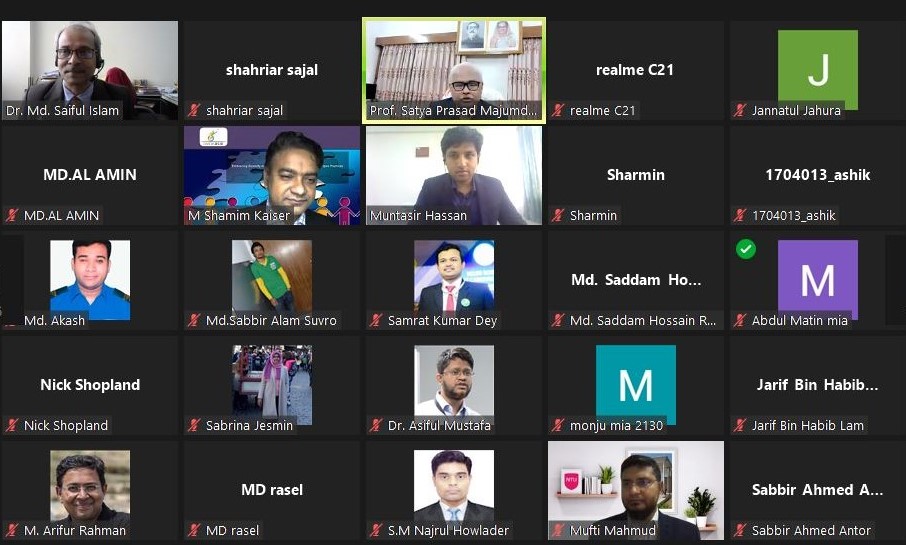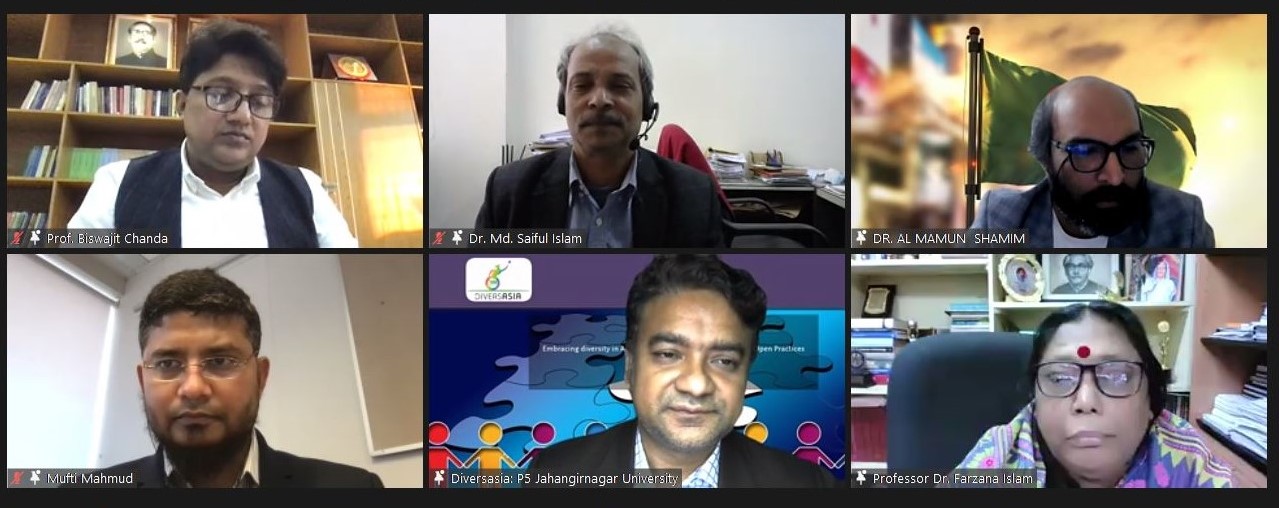A two-day long virtual international workshop on “Personalized and Inclusive Education in Bangladesh: Challenges and Prospects” was jointly conducted by the Institute of Information and Communication Technology (IICT) of BUET and the Institute of Information Technology (IIT) of Jahangirnagar University (JU) during February 6-7 February, 2022. This workshop has been conducted as part of the DiversAsia Project entitled “Embracing Diversity in Asia Through the Adoption of Inclusive Open Practices”, funded by the European Union under the Erasmus+ program, to facilitate capacity building among Indian and Bangladesh universities with a compendium of inclusive and personalized education guidelines together with a validation toolkit that will evaluate and provide guidelines for further improvement of the existing open educational resources and massive open online courses. The workshop aimed to discuss the major challenges and potential that students with special needs experience in higher education, as well as the active role of policymakers in Bangladesh. Almost 200 participants joined the virtual workshop, which included students, faculty members and policymakers from different higher education institutions across the country. The inauguration ceremony took place on February 6, 2022. The workshop was graced by the honorable Vice Chancellor of BUET Prof. Dr. Satya Prasad Majumder, as the Chief Guest. Prof. Dr. Rubaiyat Hossain Mondal, Director of IICT of BUET and Dr. Mufti Mahmud of Nottingham Trent University (UK), were also present as the Guests of Honor. Other special personnel Prof. Dr. Md. Saiful Islam of IICT of BUET, Prof. Dr. M. Shamim Kaiser, Director, IIT and Prof. Dr. Shamim Al Mamun of JU, Dr. Hossen Asiful Mustafa and Mohammad Muntasir Hassan of IICT, BUET were also present in this ceremony.

The opening welcome speech was given by Prof. Dr. Md. Saiful Islam and highlighted the aims and objectives of the workshop after welcoming the guests. Greeting the guests and participants, The Chief Guest, Prof. Dr. Satya Prasad Majumder remarked that there are many students with disabilities in our country, but we have not focused that much on how we can bring them into mainstream of higher education. He emphasized that the outcomes of this DIVERASIA project will produce some useful and impactful results that will help to change the current higher education scenario for students with disabilities. And this virtual workshop is an important step in realizing that goal as it will focus on inclusive education and the current challenges that are present in Bangladesh.
The workshop consisted of several academic and technical sessions. Distinguished faculty members from NTU, IIT Palakkad, and VIT discussed different topics based on various solutions using artificial intelligence and machine learning that can be applied to overcome the present challenges faced by disabled students trying to get access to higher education as well as to use the open educational resources and massive open online courses available online.
On the second day, two survey questionnaires were provided- one for the students with disabilities and other one is for administrators and academic staff, to get proper feedback. After analyzing the gathered data, outcomes will be provided to policymakers to overcome the existing challenges.
A panel discussion was also held for the attendees and academic staff after the Q & A session. The respective panelists were Dr. Md. Fakhrul Islam, Director of Strategic Planning at the University Grant Commission, Dr. Mufti Mahmud of Nottingham Trent University (UK, Prof. Dr. Muzharul Mannan, Consultant Neurologist at Bangabandhu Sheikh Mujib Medical University and Sumaiya Tasneem Haque, Lecturer at North South University. The panel discussion was moderated by Prof. Dr. Shamim Al Mamun of JU. The discussants provided a brief discussion about the inclusive policies and practices that currently exist in educational institutions and the support needed to provide inclusive education and personalized learning in a higher educational institution. The outcomes of the panel discussions helped the participants to understand the challenges to overcome and the potential to contribute in a better way towards inclusive higher education in Bangladesh.

At the closing ceremony of the workshop, the honorable Vice Chancellor of JU Prof. Dr. Farzana Islam and member of the UGC Prof. Dr. Bishwajit Chanda were present at the closing ceremony. Prof. Dr. Farzana Islam mentioned that JU has already taken some necessary steps for the accessibility of disabled students on its university campus and established a center named “Anandashala” for the development of autistic children. She also encouraged everyone to work together to help the disabled students and not separate them from the rest of the students. Prof. Dr. Bishwajit Chanda pointed out that those who need special education should pay more attention to equality than equality in their education and lauded all DiversAsia team members and partners for their benevolent approaches and initiatives to supporting impaired students in higher education institutions.
After the speeches of the special guests, the moderator concluded the workshop by thanking all the guests, organizers, facilitators, and participants. In the near future, BUET and JU intend to host additional workshops for impaired students in Bangladesh.
The event was covered by Shafak Shahriar Sozol, who is a student of IICT at BUET and a research assistant for the DiversAsia project.
